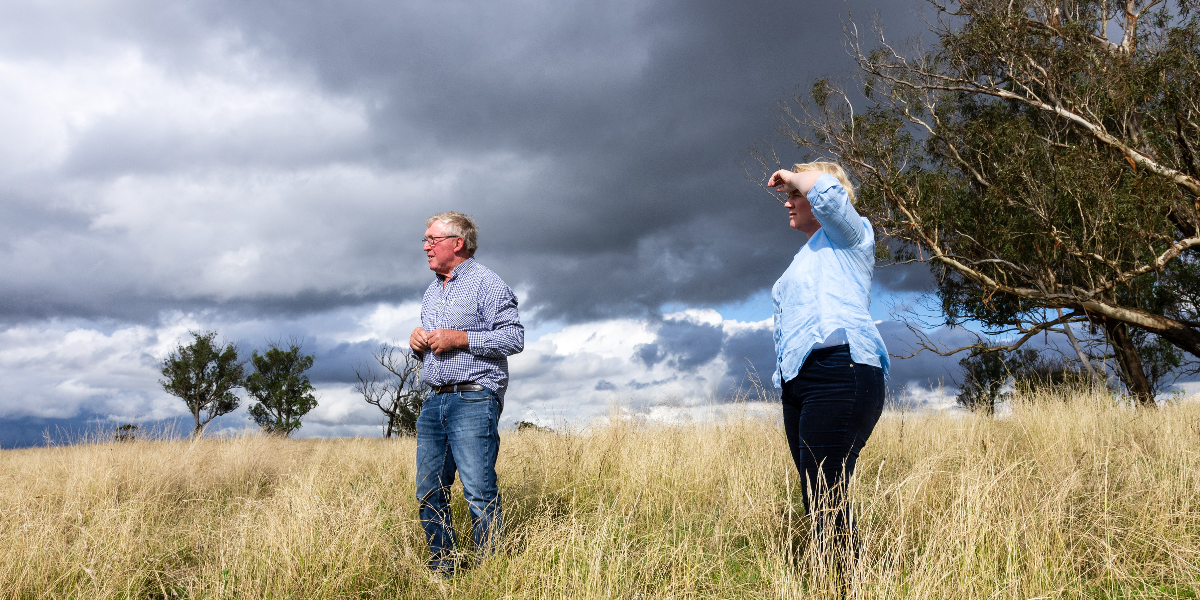The Winterbourne Wind Farm will be a boon for Walcha, a local farming family says, by ameliorating climate change and offering new income for the town that relies heavily on agriculture.
The project, which awaits an independent review that was triggered by 882 submissions to the IPC, would involve creating a string of turbines around the northern and eastern edges of Walcha, as well as building the infrastructure required to service it.
The Fletcher family has been raising sheep and cattle around Walcha since 1863, and their land will host some of the proposed turbines for the wind farm.
Crucially, it would create both another revenue stream for farmers to fall back on in times of drought – and by replacing fossil fuel power plants with wind, the Fletchers hope that the frequency of such extreme weather events will be lessened.
“We run sheep and cattle,” Warwick Fletcher says, “and if it doesn’t rain, our production levels deteriorate.
“We’ve had years where we’ve had negative returns on assets, year in, year out.”
The royalties from the wind turbines would help keep their farms afloat in tough times, with the memory of the 2019 drought still fresh in their minds, the Fletchers feel hosting turbines would provide the buffer they need.
“Everyone keeps telling us (farmers) can’t rely on handouts,” Warwick says, “We need to diversify, and this is a great way to diversify our enterprise.”
“And if we get a drought or a flood, the wind keeps turning, and the turbines keep generating an income.”
Critics have stated that the project, located partially on the edge of Oxley Wild Rivers National Park, is a biodiversity risk, but proponents are hoping for a long-term strategic benefit from alternative energy projects.
By decreasing fossil fuel emission from coal- and gas-fired power plants, Holly Fletcher believes that the climate change that exacerbates bushfires will be less likely to happen.
“We’re going to have more droughts, they’re going to be more frequent, they’re going to be more intense,” Holly says.
“They’re going to be followed by fires, floods, and storms. So we know the effects of climate change are real. The people in the bush experience it more than anyone else in the country.”
“I’m of the opinion that the people that are most affected by climate change should be the most supportive of addressing climate change.”
The wind farm would also come with a significant community benefit fund, which could provide up to $850,000 a year to Walcha for the life of the project.
This fund would be a great benefit to the town, Warwick says.
“I think this Community Fund is a big game changer for the town as well, if it’s done correctly – for sporting clubs and that and service clubs.”
“But I’d also like to see it go into helping the youth of the town, especially education.”
Despite being deemed a state significant project by the New South Wales coalition government, the project does not have the backing of either Federal Member for New England Barnaby Joyce, or State Member for Northern Tablelands Adam Marshall, who will inherit Walcha into his electorate when the boundaries shift for the upcoming State election.
Both spoke out against the project at a Voice For Walcha public meeting in January, which Warwick sees as a politically short-sighted move on the Nationals’ part – without a new industry for country towns, like renewable energy, people will continue to drain away from rural areas.
“How many Nationals in the Federal Parliament?” Warwick asks.
“There’s going to be less and less people in the bush to vote for them.”
Top image: Warwick and Holly Fletcher, on their property outside Walcha. (Tom Plevey)
Have something to say about this story? Submit your own opinion piece, or quick word, to The Net.

